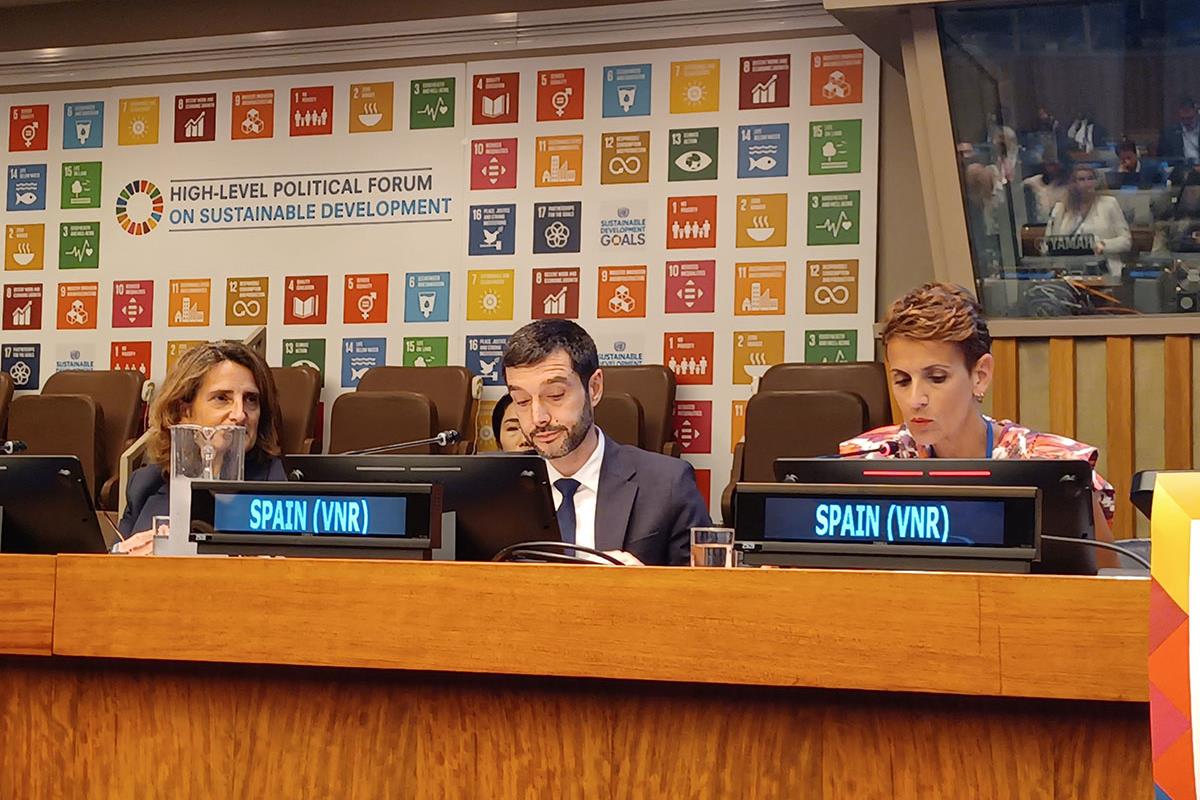Pablo Bustinduy presents the challenges of the 2030 Agenda at the UN: "We must strengthen the welfare state globally"
News - 2024.7.16
 The Minister for Social Rights, Consumer Affairs and 2030 Agenda, Pablo Bustinduy, at the UN headquarters with the Minister for the Ecological Transition and the Demographic Challenge, Teresa Ribera, and the president of Navarre, María Chivite
The Minister for Social Rights, Consumer Affairs and 2030 Agenda, Pablo Bustinduy, at the UN headquarters with the Minister for the Ecological Transition and the Demographic Challenge, Teresa Ribera, and the president of Navarre, María Chivite
Pablo Bustinduy, Minister for Social Rights, Consumer Affairs and 2030 Agenda, presented the Spanish Voluntary National Review on Agenda 2030 this Monday at the UN headquarters in New York. This is an assessment of the work Spain is doing to achieve the 17 Sustainable Development Goals (SDGs) set by the United Nations and signed by 193 countries. This is the third time that Spain has undergone this review, making it the European country that has had its sustainable development commitments assessed the most times. At the presentation of the review, Minister Bustinduy was accompanied by Teresa Ribera, Third Vice-President of the Government and Minister for Ecological Transition and Demographic Challenge. The Spanish delegation also included María Chivite, President of the Government of Navarre, who was representing the autonomous communities, and members of local entities, civil society and the 2030 Agenda commission in the Upper House of Parliament.
In the presentation of the review, Pablo Bustinduy stressed that the Government of Spain's political project is "fully aligned" with the SDGs, pointing out that the Government's priorities for the development of the 2030 Agenda include articulating public policies to fight poverty and inequality, tackling the climate and environmental crisis, eradicating precariousness and addressing the care crisis. "And all this will be possible if we can deploy fair taxation, both nationally and globally. It is the challenge of an era, a geopolitical, ecological and social challenge that is urging us to protect democracy and fight for peace," the minister said at the UN, where he set the objective of "strengthening the welfare state" as a common challenge for all countries.
"The 2030 Agenda must move forward at the international and state levels, and also at other levels. And that is what we are doing in Spain, promoting the localisation of the SDGs with regional governments and city councils, while also working hand in hand with civil society organisations," said Pablo Bustinduy. The minister defended the 2030 Agenda as "a roadmap that allows us to offer a horizon in a context of uncertainty throughout the world". In this regard, he referred to the "difficult international situation we are currently experiencing" with the impact of the climate emergency, the complications of the international economy and "the unbearable violence on the geopolitical stage with the Russian aggression in Ukraine and the genocide in Gaza".
In this context, Pablo Bustinduy pointed out that the Government of Spain has committed itself to offering "a response of solidarity and broadening of rights", stressing that this orientation is also reflected in the executive's external action, "especially in the recognition of the State of Palestine and in our unwavering commitment to support its cause".
The participation in this Voluntary National Review at the UN was preceded by a meeting between Minister Bustinduy and Vice-President Ribera with Amina J. Mohammed, Deputy Secretary-General of the UN, and Achim Steiner, Administrator of the UN Development Programme, and questions from the Chilean and South African delegations.
Social protection and gender bias
In the framework of this National Review, the Secretary of State for Social Rights, Rosa Martínez, took part in the forum "Poverty and Social Protection: towards the World Social Summit" organised by Chile to address the situation of poverty experienced by more than 700 million people in the world. According to the organisation, this means that 10% of the world's population must struggle to meet basic needs such as health, education, sanitation and drinking water. Rosa Martínez also put the spotlight on the "vulnerable situation suffered by millions of women due to the continuing gender biases".
In this respect, the Secretary of State stated that public policies must consider the wage gap suffered by women "due to the fact that, for the most part, they continue to take on care in the family sphere, a task that penalises them in terms of work". To reverse this situation, Rosa Martínez highlighted the work being done by the ministry headed by Bustinduy to transform social protection in Spain and move from a culture of assistance to a focus on rights.
Non official translation




